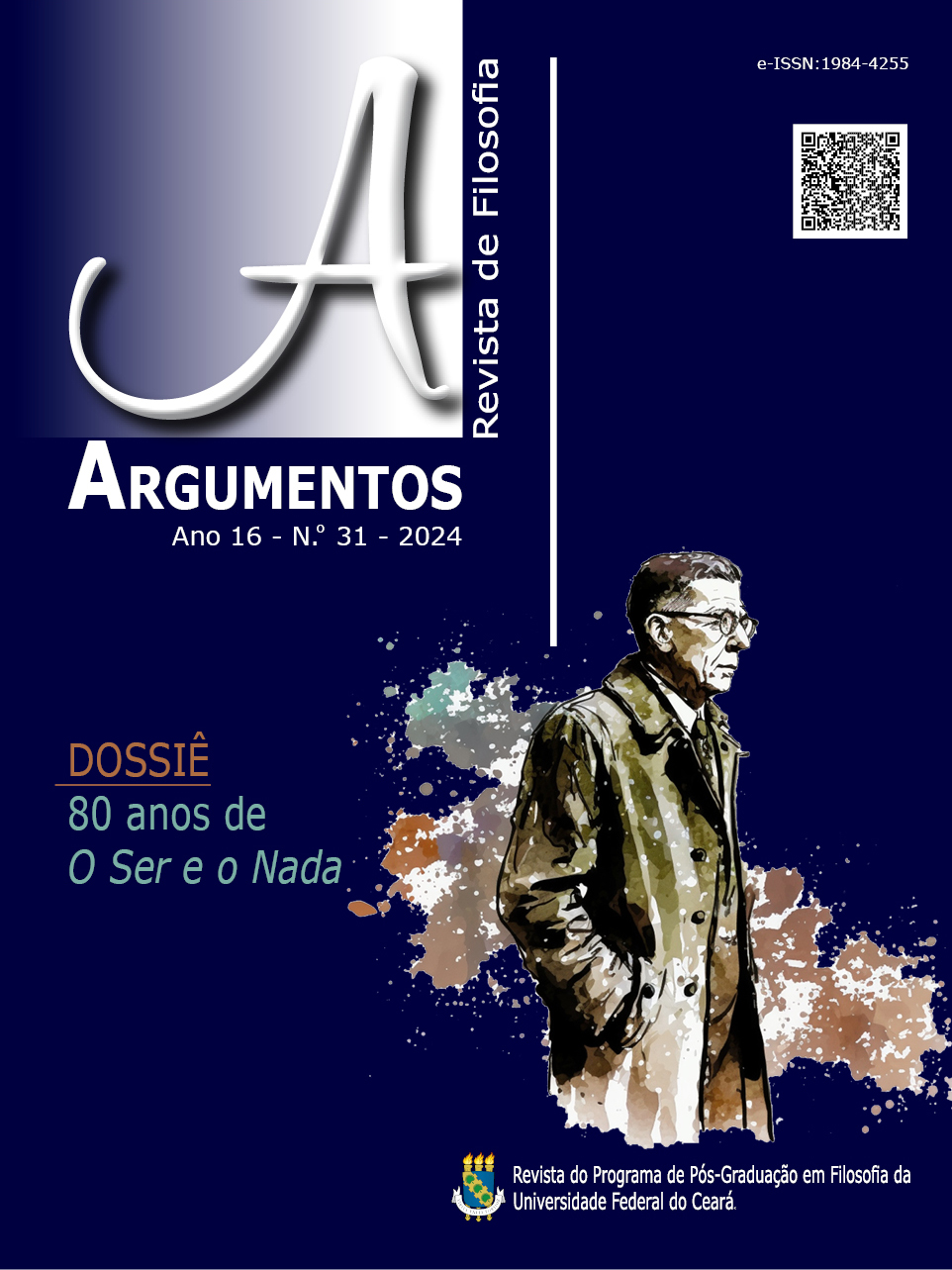Antecedentes epistêmicos da ontologia social
DOI:
https://doi.org/10.36517/Argumentos.31.19Keywords:
Ontologia Social. Sociabilidade. Ideia. Senso comum. Imagem. Epistemologia.Abstract
Este artigo explora como a epistemologia desempenha um papel no domínio da ontologia social. A minha principal afirmação é que cada faceta do domínio social com que lidamos necessita de um enquadramento epistêmico e de um contexto na construção de uma ontologia, dependendo do fato de ter uma realidade e existência ontológica. Penso que dois fundamentos contribuem significativamente para esta afirmação. O primeiro deles é a noção de ideia e seu requisito de fundamentação na esfera social, e a outra é o conceito relativo ao senso comum. Portanto, a parte inicial deste artigo centra-se no tratamento e exame da noção de ideia. A minha afirmação principal nesta seção é a demonstração de que o conceito de ide tem uma interligação linguística e que esta ligação necessita de uma base dentro da base ou contexto social. No fragmento subsequente, onde se discute o conceito de bom senso, argumenta-se que o bom senso é um atributo compartilhado entre todos os indivíduos em comum no campo social, e se enfatiza que esse bom senso compartilhado serve como um componente essencial para a tomada de decisões, fornecendo seus fundamentos epistemológicos no contexto social.References
ADORNO, Theodor. Minima Moralia. London: Verso, 2005.
DESCARTES, Rene. A Discourse on the Method of Correctly Conducting One’s Reason and Seeking Truth in the Sciences. New York: Oxford University, 2006.
ELDRED, Michael. Social Ontology Recasting Political Philosophy Through a Phenomenology of Whoness. Frankfurt: Ontos, 2008.
EPSTEIN, Brian. A Framework for Social Ontology. Philosophy of the Social Sciences, v. 46, n. 2, p. 147-167, 2016.
GALLOTTI, Mattia; MICHAEL, John. Objects in Mind. Perspectives on Social Ontology and Social Cognition. London: Springer, 2014. p. 1-13.
HATTAB, Helen. Descartes On Forms and Mechanisms. New York: Cambridge University, 2009.
IKAHEIMO, Heihhi; LAITINEN, Arto. Recognition and Social Ontology: An Introduction. Recognition and Social Ontology. Boston: Brille, 2011. p. 1-21.
LENNON, Thomas M. Locke and the Logic of Ideas. History of Philosophy Quarterly, v. 18, n. 2, p. 155-177, abr./2001.
LOCKE, John. An Essay Concerning Human Understanding. Oxford: Clarendon, 1975.
MARKIE, Peter. The Cogito and its Importance. In: COTTINGHAM, John (Ed.). The Cambridge Companion to Descartes. New York: Cambridge University, 2005.
MOORE, Terence. Locke’s Parrot. Think, Autumn, n. 1, p. 35-44, 2009.
PLATON. The Republic of Plato. New York: Basic Books, 1991.
PRISELAC, Matt. Locke’s Science of Knowledge. New York: Routledge, 2017.
PUTNAM, Hilary. Representation and Reality. Cambridge: MIT, 1988.
ROOT, Michael. Philosophy of Social Science the Methods, Ideals, and Politics of Social Inquiry. Cambridge; Oxford: Blackwell, 1996.
SEARLE, John R. Social Ontology: Some Basic Principles. Papers, n. 80, p. 51-71, 2006.
SPALLANZANI, Mariafranca. First Philosophy, Metaphysics, and Physics. In: ANTOINE-MAHUT, Delphine; ROUX, Sophie (Eds.). Physics and Metaphysics in Descartes and in His Reception. New York: Routledge, 2019.
STEKELER, Weithofer P. Intuition, Understanding, and the Human Form of Life. In: IKÄHEIMO, Heikki; LAITINEN, Arto (Eds.). Recognition and Social Ontology. Boston: Brill, 2011. p. 85-117.
Downloads
Published
Issue
Section
License
Argumentos magazine is licensed under an International Creative Commons Attribution License.
The Magazine uses CC BY inclusion
1) The authors retain the copyright granted to the magazine or the right to initial publication, with the work regularly licensed under the Creative Commons Attribution, which allows the sharing of the work with acknowledgment of authorship and initial publication in this magazine.
2) The authors are authorized to contract additional applicable contracts, for non-exclusive distribution of the version of the work published in this journal (for example, publication in the institutional repository or as a chapter of the book), recognition of authorship and initial publication in this journal.
3) Authors are authorized and encourage to publish and distribute their work online (for example, in institutional repositories or on their personal pages) at any time before or during the editorial process, as they can generate productive changes, as well as increase the impact and reference of published work.




.jpg)










._._3.png)
1.jpg)
._._._.png)
